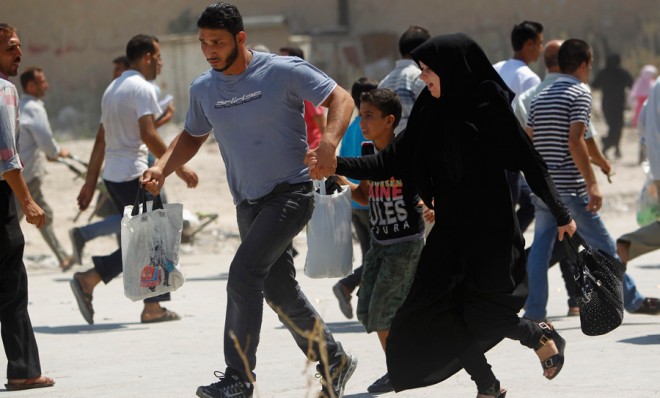Why the U.N. might never verify Syria's chemical-weapon attack
Don't hold your breath for an international response to the alleged atrocity


A free daily email with the biggest news stories of the day – and the best features from TheWeek.com
You are now subscribed
Your newsletter sign-up was successful
The Syrian opposition's claim that government forces used poison gas to massacre more than 1,000 people could mark a turning point in the international community's response to the country's two-year civil war — but only if investigators can prove it.
France on Thursday called for a "reaction with force" if investigators verify the report, which was supported by horrific videos showing rows of corpses. President Obama previously called the use of chemical weapons a "red line" that would justify greater foreign intervention in the conflict. And on Wednesday, an Obama administration official said, "There are strong indications there was a chemical weapons attack — clearly by the government."
However, the official warned that the U.S. and its allies must "do our due diligence and get all the facts" before formulating a response. That won't be easy, though, and critics frustrated with Obama's hands-off policy toward Syria fear that the obstacles to collecting definitive proof could prevent an international reaction to what would be the deadliest chemical-weapon attack yet in Syria.
The Week
Escape your echo chamber. Get the facts behind the news, plus analysis from multiple perspectives.

Sign up for The Week's Free Newsletters
From our morning news briefing to a weekly Good News Newsletter, get the best of The Week delivered directly to your inbox.
From our morning news briefing to a weekly Good News Newsletter, get the best of The Week delivered directly to your inbox.
The Syrian government says the charge is "absolutely baseless," and it still has allies at the United Nations capable of providing the regime of President Bashar al-Assad with crucial cover. Colum Lynch at Foreign Policy notes that, at an emergency Security Council meeting late Wednesday, Russia and China managed to water down a resolution about Syria so thoroughly that it didn't even mention this attack directly. A tougher draft circulated by the U.S. would have called on Syria to give U.N. inspectors already in the country immediate access to the scene of the attack, but it never made it to a vote. The final draft merely called for clarity on the issue of chemical weapons, Lynch says, and "Syria's cooperation appears unlikely."
Assad's forces provided proof of that quickly enough. Syrian activists said Thursday that Assad's forces were continuing their offensive in the rebel-held eastern suburbs of Damascus, where the alleged chemical-weapon attack occurred, further cutting the area off from outside observers.
The protection offered by Russia and China at the U.N., as well as a few more days of bombing, might be all it takes to prevent a definitive confirmation of the rebels' accusations. Frank Gardner at BBC News says Assad's government, backed by Russia, insists that the area is unsafe as long as the fighting continues, so there's only a slim chance U.N. inspectors will be able to reach the site in time to make a clear call.
If an agent such as sarin has been used, the U.N. team would need to get to the site within days before traces become so faint as to be inconclusive. And if, as the opposition claims, it was a government attack, then a delay of days or weeks would give it enough time for forensic evidence to become controversial and for evidence of munitions used to be removed. The Syrian government insists it was the rebels who carried out the attack. [BBC News]
The international response to Syria may indeed be approaching a turning point — but one that favors Assad rather than the rebels. There was only a muted outcry after Egypt's military last week killed hundreds of Islamists demanding the reinstatement of the country's elected president, so Assad may be right in assuming that the enthusiasm for the Arab Spring has waned to the extent that he can get away with almost anything.
A free daily email with the biggest news stories of the day – and the best features from TheWeek.com
The writing has been on the wall for months, suggests The Washington Post in an editorial. After all, the U.S. balked at taking decisive action at the first reports of smaller chemical-weapon attacks in the spring, and the Obama administration's promise two months ago to begin sending the rebels military supplies has yet to be fulfilled. The U.S. should use its own resources to determine what happened, the Post says, and retaliate accordingly.
But don't count on that happening. "What we saw in Egypt signals that America has changed its mind and has backed away from the Muslim Brotherhood and all these Islamic groups," Syria expert Joshua Landis tells National Journal. "And the Syrian rebel groups are to the right of the Muslim Brotherhood."
As Michael Hirsh puts it at National Journal, "Advantage, Assad."
Harold Maass is a contributing editor at The Week. He has been writing for The Week since the 2001 debut of the U.S. print edition and served as editor of TheWeek.com when it launched in 2008. Harold started his career as a newspaper reporter in South Florida and Haiti. He has previously worked for a variety of news outlets, including The Miami Herald, ABC News and Fox News, and for several years wrote a daily roundup of financial news for The Week and Yahoo Finance.
-
 How the FCC’s ‘equal time’ rule works
How the FCC’s ‘equal time’ rule worksIn the Spotlight The law is at the heart of the Colbert-CBS conflict
-
 What is the endgame in the DHS shutdown?
What is the endgame in the DHS shutdown?Today’s Big Question Democrats want to rein in ICE’s immigration crackdown
-
 ‘Poor time management isn’t just an inconvenience’
‘Poor time management isn’t just an inconvenience’Instant Opinion Opinion, comment and editorials of the day
